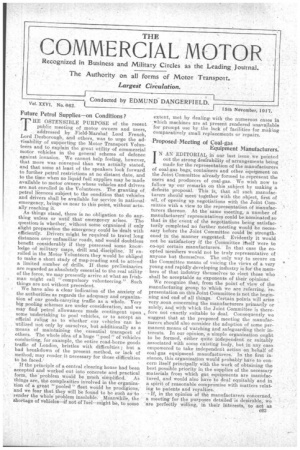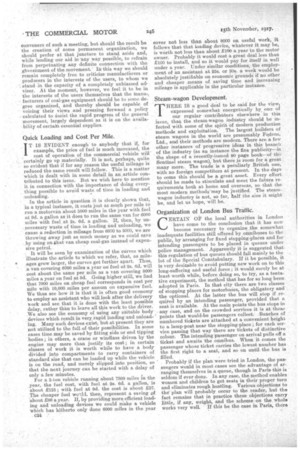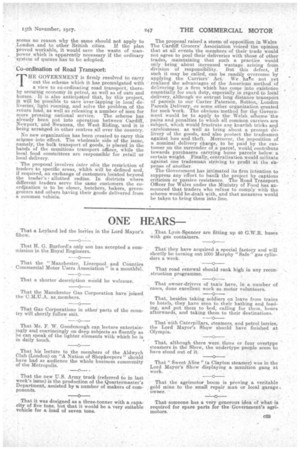Future Petrol Supplies—on Conditions? T HE OSTENSIBLE PURPOSE of the recent
Page 1

Page 2

Page 3

If you've noticed an error in this article please click here to report it so we can fix it.
public meeting of motor owners and users, . addressed by Field-Marshal Lord French, Lord Desborough, and others was to urge the advisability of supporting the Motor Transport Volun • teem and to explain the great utility of commercial motor vehicles in the general scheme of defence against invasion. , We cannot help feeling, however, that more was conveyed than was actually stated, and that some at least of the speakers look forward to further petrol restrictions at no distant date, and to the time when no liquid fuel supplies may be made available to motor owners whose vehicles and drivers are not enrolled in the Volunteers. The granting of. petrol licences subject to the condition that vehicles and drivers shall be available for service in national emergency, brings us near to this point, without actually reaching it. As things stand, there is no obligation to do anything unless or until that emergency arises. The question., is whether; without some organized if only slight preparation the emergency could be dealt with efficiently. Drivers might be required to travel long distances over unfamiliar roads, and would doubtless benefit considerably if they possessed some knowledge of military maps, drill and discipline. If enrolled in the Motor Volunteers they would be obliged to make a short study of map-reading and. to attend a limited number of drills. If these preliminaries are regarded as absolutely essential to the real utility of the force, we may presently arrive at what an Irishman might call "compulsory volunteering." Such things are not without precedent. • We have also a clear indication of the anxiety of the authorities as regards the adequacy and organization Gf our goods-carrying traffic as a, whole. 'Very big pooling schemes are under consideration, and we may find petrol allowances made contingent upon some undertaking to pool vehicles, or to accept an official rulieg as to whether our vehicles can be utilized not only by ourselves, but additionally as a means of maintaining the essential transport of others. The whole idea of a huge ". pool " Of vehicles conducting, for example, the entire road-borne goods traffic of London, bristles with difficulties ; but a bad breakdown of the present method, or lack of method, may render. it necessary for those difficulties to be faced.
• If the principle of a central clearing house had been accepted and worked out into concrete and practical form, the problem would be much simplified. As things are, the complexities involved in the organization of a great "pooled " fleet would be prodigious, and we fear that they Will be 'found to be such as-to render the whole probleminsoluble. Meanwhile, the shortage Of Vehicles—if not Of fuel-arnight be, to some extent, met by dealing‘ with the numerous cases in _which machines are at present rendered unavailable for prompt use by the lack of facilities for making comparatively small replacements 'or repairs.
Proposed-Meeting of Coal-gas Equipment Manufacturers.
IN AN EDITORIAL in our last issue we pointed out the strong desirability of arrangements being • made for the representation of the manufacturers Of coal-gas bags, containers and other equipment on the Joint Conainittee already formed to represent the users and producers of coal-gas. We wish now to follow up our remarks on this subject by making a definite proposal. This iS, that all such manufacthrers should meet together with the object, first of all, of opening up negotiations with the Joint Committee with a view to the representation of Manufacturers thereon. At the same meeting, a number of manufacturer& representatives could be nominated so that in the 'event of the negotiations being satisfactorily completed no further meeting would be necessary before the Joint Committee could lie strengthened in the manner suggested. Evidently it would not he satisfactory if the Committee itself were to co-opt certain manufacturers. In that case the coopted members would not be truly representative of anyone but themselves. The only way to secure on the Committee means of voicing the views of a very young and rapidly developing industry is for' the members of that induktry themselves to elect those who shall be acceptable as exponents of their opinions. We recognize that, from the point of view of the manufacturing group to which we are referring, 'representation on this Joint Committee is not the beginning and end of all things. Certain points will arise very .soon concerning the manufacturers primarily or solely, and with which the Joint Committee is therefore not exactly suitable to deal. Consequently we suggest that at the proposed meeting the manufacturers should also consider the adoption of some permanent means of watching and safeguarding their interests. In our opinion, a simple organization ought to be formed, either quite independent or suitably associated with some existing body, but in any case empowered to take independent action on behalf of coal-gas equipment manufacturers. In the first in-stance, this organization would probably have to concern itself principally with the work of obtaining the best possible priority in the supplies of the necessary materials from which gas equipments are mannfactured, and would also have to deal equitably and in a sPirit of reasonable compromise with matters relating to patents and royalties. e. If, in the opinion of the manufacturers concerned, • a meeting for the purposes detailed is'desirable,we rare -perfectly willing, in their interests,-to act as _ 023 conveners of such a meeting, but should the result be the creation of some permanent organization, we should prefer at that juncture to stand aside and, while lending our aid in-any way possible, to refrain from perpetuating any definite connection with the gbvernment of the movement-. In this way we should remain completely free to criticise manufactUrers or producers in the interests of the users, to whom we stand in the capacity of a completely unbiassed adviser. At the moment, however, we feel it to be in the interests of the users themselves that the Manufacturers of coal-gas equipment should be to some degree organized, and thereby should be capable of voicing their views and pressing forward a policy calculated to assist the rapid progress of the general movement, largely dependent as it is on the availability of certain essential supplies.
Quick Loading and Cost Per Mile.
T IS EVIDENT enough to anybody that if, for example, the price of fuel is much increased, the cost of operation of the commercial vehicle will certainly go up materially. It is not, perhaps, quite so evident that if for any reason the useful mileage is reduced the same result will follow. This is a matter which is dealt with in some detail in an,article contributed to this issue. But we wish here to mention it in connection with the importance of doing everything possible to avoid waste of time in loading and • unloading.
. In the article in question it is clearly shown that, in a typical instance, it costs just as much per mile to run a motorvan about 5000 miles in the year with fuel. at 9d. a gallon as it does to run the same van for 6000 miles with fuel at 2s. 6d. a gallon. If, then, by unnecessary waste of time in loading and unloading, we cause a reduction in mileage from 6000 to 5000, we are throwing away jut as /nisch money as we could save by using on that van cheap coal-gas instead of expensive petrol. It will be seen by examination of the curves which illustrate the article to which we refer, that, as mile • -ages grow larger, the curves get further apart. Thus, • a van covering 6000 miles a year on fuel at 2s. 6d. will cost about the same per mile as a van covering 8000 miles a year on fuel at Dd. Going higher still, we find that 7000 miles on cheap fuel corresponds in cost per mile with 10,000 miles per annum on expensive fuel. We thus see how it is that it is often good economy to employ an assistant who will look after the delivery work and see that it is done with the least possible delay, rather than to leave all this work to the driver. We also see the economy of using any suitable body devices which result in very rapid loading and unloading. Many such devices exist, but at present they are not utilized to the full of their possibilities. In some cases time may be saved by fitting side or end tipping bodies ; in others, a crane or windlass driven by the engine may more than justify its cost ; in certain classes of work it is worth while to have a body divided into compartments to carry containers of standard size that can be loaded up while the vehicle is on the road, and merely slipped into position, so that the next journey can be started with a delay of only a few minutes. For a 3-ton vehicle running about 7500 miles in the .year, the fuel cost, with fuel at 2s. 6d. a gallon, is about £125; with fuel at 9d. the cost is about £37. The cheaper fuel wo-lid, then, represent. a saving of about £90 a year. If, by providing more efficient loading and unloading devices we could make a vehicle which has hitherto only done 6000 miles in the year cover not less th'asi about 8000 on useful work, it follows that that loading device, whatever it may be, is worth not less than about £100 a year to the motor owner. Probably it would cost a great deal less than 2100 to install, and so it would pay for itself in well under a year. Under similar conditions, the employment of an assistant at 25s. or 30s. a week would be absolutely justifiable on economic grounds" if no other and cheaper _means of saving time and increasing mileage is applicable in the particular instance.
Steam-wagon Development.
HERE IS a good deal to be said for the View, expressed somewhat energetically by oneof our regular contributors elsewhere in this issue, that the steam-wagon industry should be infected with some of the spirit of modern production methods and exploitation. The largest builders of steam wagons in the world are presumably Foclens, Ltd., and their methods are modern. There are a few other instances of progressive ideas in this branch _ of the industry (as an instance the fine publicity—in the shape of a recently-issued 90 page book—of the Sentinel steam wagon), but there j.s room for a great many more.., The trade is a peculiarly. British one, with no foreign competitors at present. In the days to come this should be a great asset. Every effort should be made to stimulate and meet the future requirements both at home and overseas, so that the most modern methods'may be justified. The steamwagon industry is not, so far, half the size it might' be, and let us hope, will be.
Organization of London Bus Traffic.
CERTAIN OF the local authorities in London have come to the conclusion that it has now become necessary to organize the somewhat inadequate facilities still offered by omnibuses to the public, by arranging for fixed stopping-places and for intending passengers to be placed in queues under police management. Apparently it is suggested that this regulation of bus queues should fall mainly to the lot of the Special Constabulary. If it be possible' it is very desirable to avoid putting new work on to this long-suffering and useful force ; it would surely be at least worth while, before doing so, to try, as a tentative experiment, the method that has for so loins been adopted in Paris. In that city there are two classes of stopping places for motorbuSes, the obligatory and the optional. At the latter the bus will stop if required by an intending passenger, provided that a seat is available. At the main points the bus stops in any case, and on the crowded services it is at these points that would-be passengers collect. Bunches of numbered tickets are attached at a convenient height to a lamp-post near the stopping-place; for each service passing that way there are tickets of distinctive colour. The intending passenger on arrival pulls off a ticket and awaits the omnibus. When it comes the passenger whose ticket carries the lowest number has the first right to a seat, and so on until the bus is filled. , Probably if the plan were tried in London, the passengers would in most eases see the advantage of arranging themselves in a queue, though in Paris this is seldoin if ever done. In any case, the method enables women and children to get seats in their proper turn and eliminates rough hustling. Various objections to the plan will probably occur to the reader, but the fact remains that in practice these objections carry little, if any, weight, and the scheme on the whole works very well. If this be the case in Paris, there seems no reason why the same should not apply to London and to other British cities. If the plan proved workable, it would. save the waste of manpower which is apparently necessary if the ordinary 'system of queues has to be adopted.
Co-ordination of Road Transport .
•
T HE GOVERNMENT is firmly 'resolved to carry
• . • out the scheme which it has promulgated with a view to co-ordinating road transport,thereby securing economy in petrol, as well as of oats and horses. , It is also anticipitted that, by this project, it will be possible to save over-lapping in local deliveries 'light running, and solve the problem of the return load,. as Well as relea,Sing a number of Men for more pressing national service. The scheme has already been put into operation between Cardiff, Newport, and Swansea, the West •Riding, -and it is being arranged in other centres all over the country.
No new organization has been created to carry this scheme into effect. The wholesale side of the issue, namely, the bulk transport of goods, is placed in the hands of the munitions transport officer, while the local food cominittees are responsible for retail or local delivery. . .
' •The proposal involves int6r alia the restriction of traders to specific areas, whMi will be defined and, if required, an exchange of customers located beyond the trader's' allotted radius. In districts where different traders serve the same customers the coordination is to be closer, butchers, bakers, greengrocers and others having their goods delivered from a common vehicle. The proposal raised a storm of opposition in Wales The Cardiff Grocers' Association voiced the opinion that at all events the members of their trade would not agree to pool their deliveries with tho,se of other trades, maintaining that such a practice would only-bring about increased wastage arising from division of responsibility. But this defect, if such it may be called, can be readily overcome by applying the Carriers'. Act. We , hate • not yet realized the advantages of the American method .of delivering by _a firm which has come into existence essentially for such duty, especially in regard to local delivery, although' we entrust long distance transport of parcels to our Carter Paterson, Sutton, London Parcels Delivery, or some other organization created for such 'work. The obvious method for the Government would be to apply to the Welsh scteme 'the pains and penalties to which all common carriers are _ subject, which would frustrate any knavish tricks and carelessness as well as bring about a prompt delivery of the goods, and also protect the tradesmen against loss and theft. Moreover, the imposition of a nominal delivery charge, to be paid by the customer on the surrender of a parcel, would contribute towards purchasers carrying home parcels below. a certain weight. Finally, centralization would militate against one tradesman striving to profit 'at the expense of another. The Government has intimated its firm intention to suppress any -effort to baulk the project by captious criticism or passive resistance. The Road Transport Officer for Wales under the Ministry of Food has announced that traders who refuse to comply with the scheme would be..dealt with, and that measures would be taken to bring them into line.
























